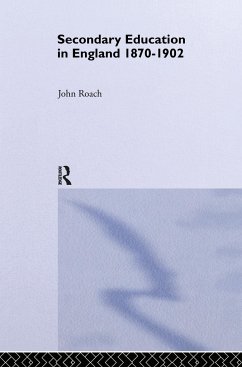In this comprehensive and extensively researched history, John Roach argues for a reassessment of the relative importance of state regulation and private provision. Although public schools in England enjoyed their greatest prestige between 1870 and 1902, in terms of educational reform and progress their importance has been exaggerated. The role of the public school, Roach suggests, was social rather than academic, and as such its power and influence is to be interpreted mainly in relation to the growth of new social elites, the concept of public service, and the needs of the empire for a bureaucratic ruling class. Only in the modern progressive movement, launched by Cecil Reddie, and the private provision for young women, was lasting progress made. Even before the 1902 Education Act the state had spent much time and effort regulating and reforming the old educational endowments, and it is in these initiatives that the foundations for the public provision of secondary educational reform are to be found.
Hinweis: Dieser Artikel kann nur an eine deutsche Lieferadresse ausgeliefert werden.
Hinweis: Dieser Artikel kann nur an eine deutsche Lieferadresse ausgeliefert werden.








